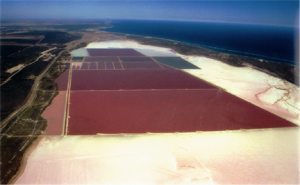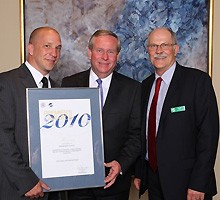When Boyd King ’88 graduated from Lafayette he followed an urge to “play hard” and became a dive instructor in the Caribbean. His curiosity and sense of adventure led to a job as a refrigeration engineer in industrial northern England, then operator of a dive/tourist business in Belize exploring caves, ocean, and jungle, then a plasma cutter in an Australian shipyard.
Some 10 years later, King found the knowledge and skills that he developed while acquiring a B.S. in biology and A.B. in engineering came into play.
“The application of my knowledge/experience gained at Lafayette emerged a decade on from college and then built momentum,” says King. “Initially, the degree was a buy-in for credibility. One can be full of big ideas and enthusiasm, but they are certainly received more readily when accompanied by a letter; something as simple as a published paper opens a door and gives you the little push to carry you forward. Then, little bits of academic memory float to the surface and coalesce with recent experience…hopefully into something useful.”
For the past 13 years, King has been manager of Hutt Lagoon for Cognis in Perth, Australia. Cognis, a worldwide supplier of specialty chemicals and nutritional ingredients with a focus on wellness and sustainability, was recently bought by BASF.

Hutt Lagoon is the world's largest algal production facility, a source for enriched artemia.
The lagoon is the largest algal production facility in the world and a source for both natural betacarotene and enriched artemia, tiny brine shrimp that live in inland saltwater lakes. Artemia, a critical food for young fish and prawns, are used as a “much-needed natural resource in the aquaculture industry,” says King.
Cognis received the 2010 Premier Award for Excellence in Public Sector Management for the Nutremia™ project, managed by King and done in conjunction with the Department of Fisheries Western Australia. They received the award for producing the world’s first carotenoid-enriched artemia and helping develop the economy of Western Australia.

Boyd King ’88 (L-R); Colin Barnett, MLA, Premier of Western Australia; Roger Taylor, Cognis.
“The success of our algal business grew from an unlikely acquisition of a small biotech company by a mining company,” explains King. “The strange mixture of process engineers, geologists, mining engineers, chemists, and biologists in a remote area led to some very different approaches to problems. The disciplines have melded into a general biotech approach. Then, you throw in the really out there discipline of ‘marketing,’ and it mutates again.”
King adds: “In the past 20 years, the storage part of our brain has moved outside of our heads and resides in a ‘google brain’ so what we’ve learned by rote is pretty limited in value. Processes are everything, and in my experience the more lateral, the better. I met and was inspired by quite a few ‘laterals’ at Lafayette.”
King is most enthused by the creative design-side of his work. “The company demands a very quick payback on most projects—12 to 24 months—but if you can put together an idea, they’ll back it. Australians have a ‘give it a go’ mentality, and our company has always nurtured this in their employees.”
“I get to work with teams to engineer production solutions, delve into aquaculture and algal biology, and still go for a dive once in while,” King says.
The fact that Cognis is now owned by BASF just expands the scope, says King. “Megawatt wind turbines, energy recovery, and an increased focus on sustainability, and the team gets all new toys to play with.”
BASF is the world’s largest chemical company with a commitment to “conduct business in accordance with the principles of sustainable development.” The company is involved in nutrition and health, oil and gas, agriculture, construction chemicals, and plastics.
How did King land in Australia? After a three-year long-distance relationship and writing letters, “I followed my pen pal to Oz. Together we have designed and built a few interesting houses from the ground up.” He notes that they also enjoy flying, diving, sailing, climbing, and taking motorcycle trips. “We photograph graffiti when in the urban, drive in the dunes when in the bush, and are toying with a boutique gourmet pink salt idea. Always still looking to play.”

